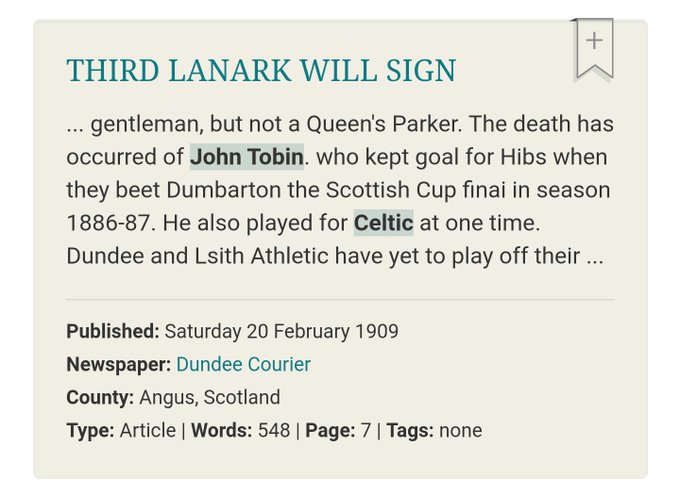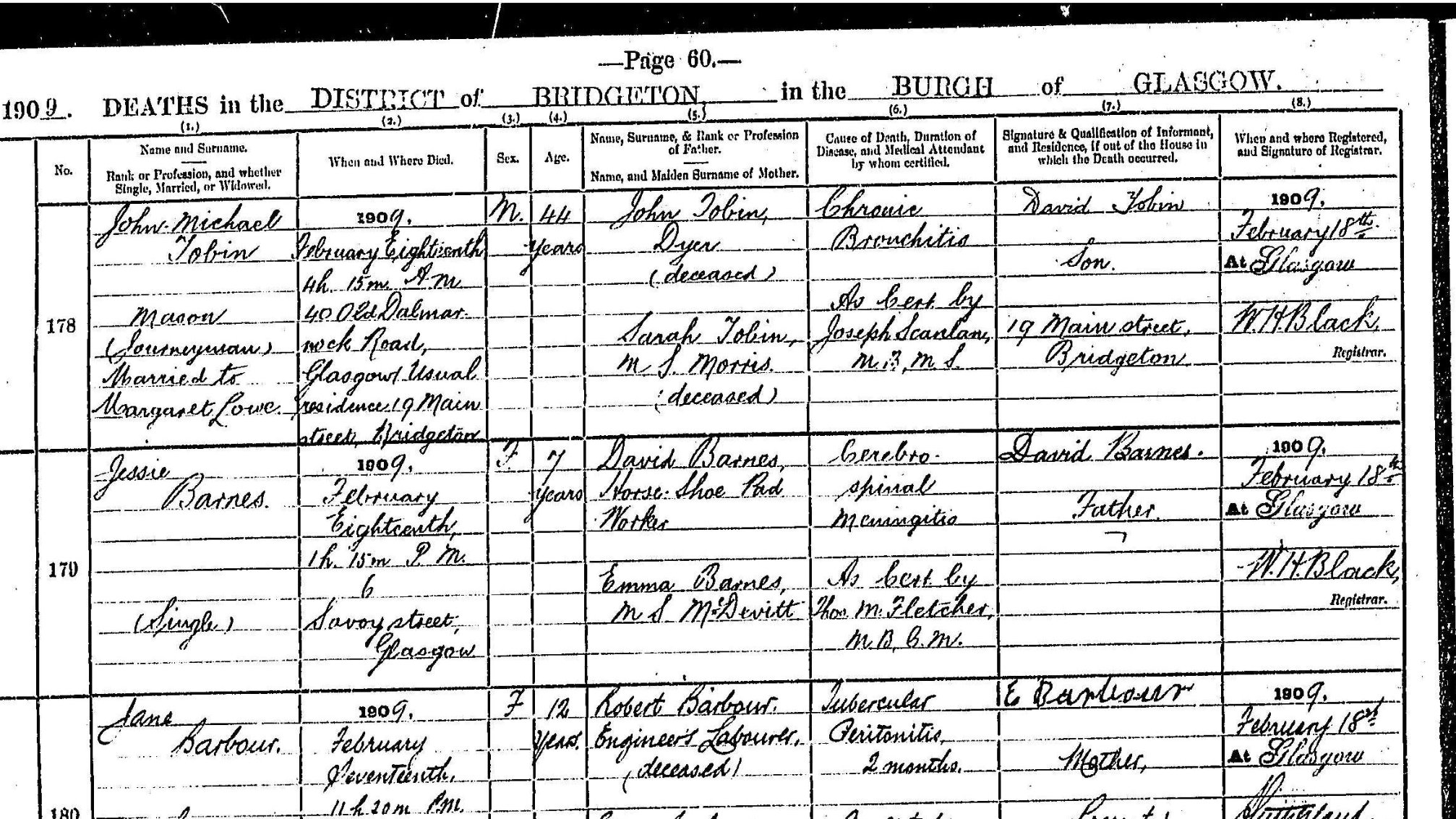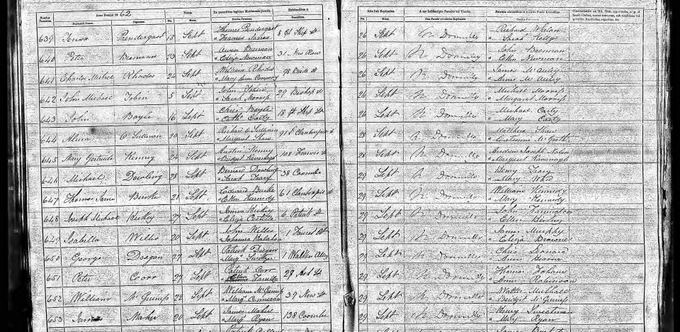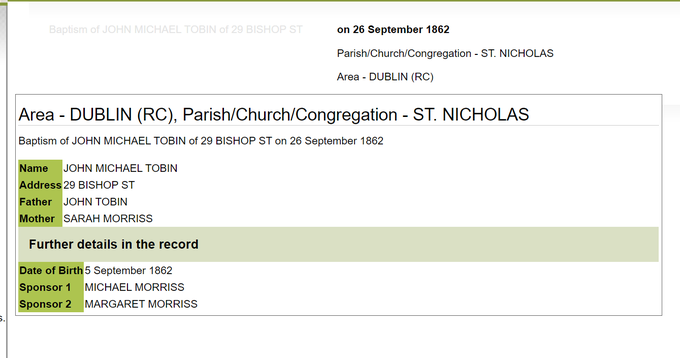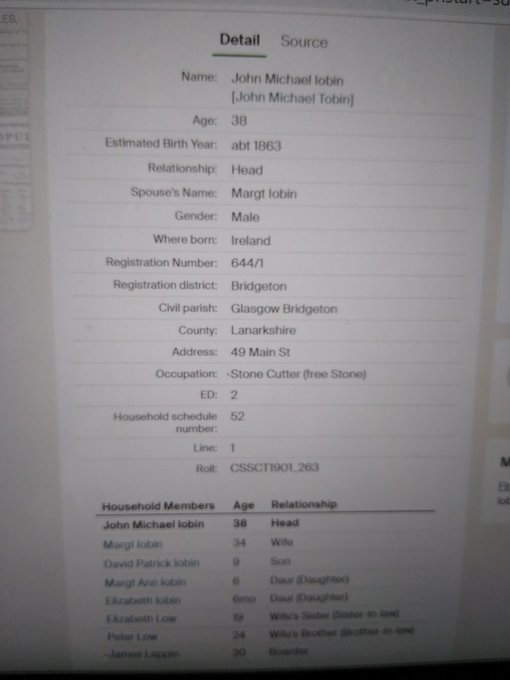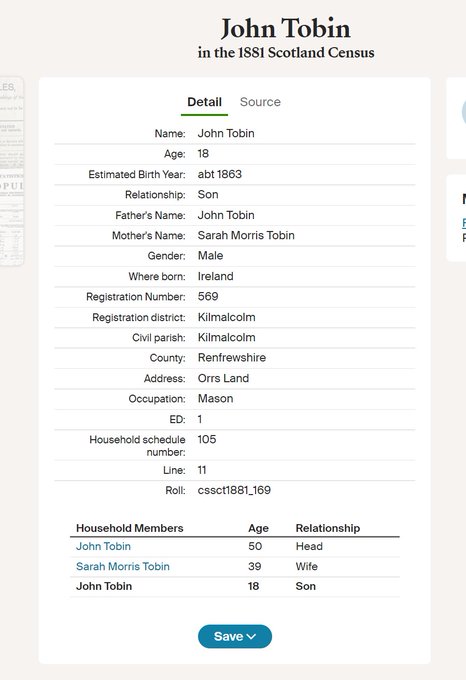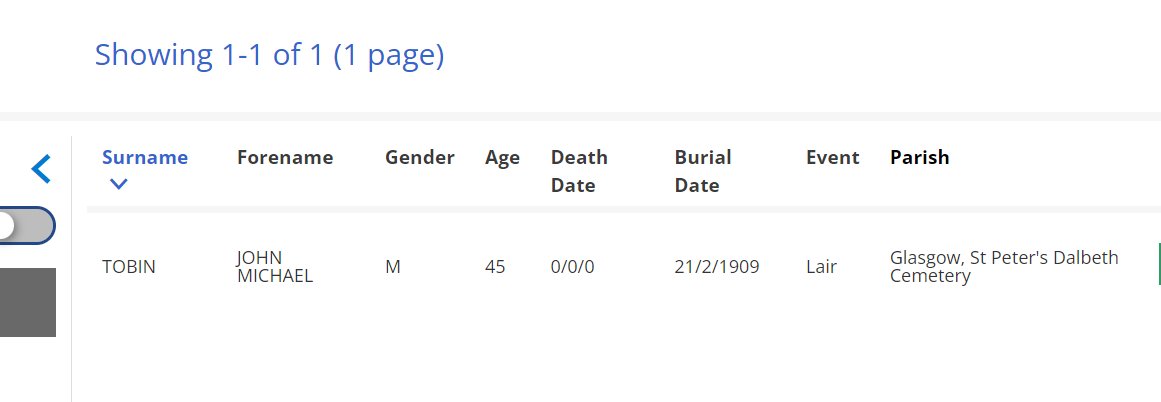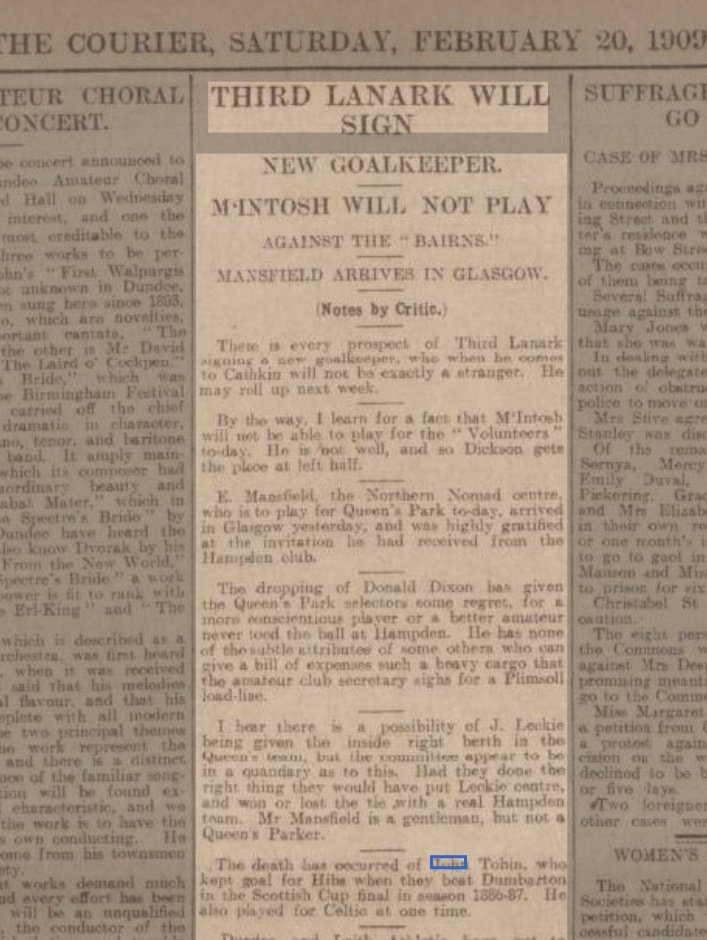| T | Player Pics | A-Z of Players |
Personal
Fullname: John Michael Tobin
aka: John Tobin
Born: 5 September 1862 (see notes)
Died: 18 February 1909
Birthplace: Dublin, Ireland (see notes)
Signed: 1888
Left: 1889
Position: Goalkeeper
Debut: Celtic 0-1 Clyde, Scottish Cup, 24 Nov 1888
Internationals: none
Biog
The Ireland born goalkeeper John Tobin must boast one of the most unique Celtic careers with his one match appearance coming in a game that never was, and then his time at Celtic sadly ending not long after.
The former Hibernian keeper (described as “a giant in stature“) was a Scottish Cup winner already with Hibernian from 1887 so came with some background, and had played in the original match that opened Celtic Park which was between Hibernian and Cowlairs. He was at Morton prior to being at Hibernian.
To this day, he is praised by Hibernian historians, as at their club in those early pivotal years and “he was to go on to have a great and illustrious career” with Hibernian, culminating with their seminal Scottish Cup title.
However, prior to arriving at Celtic, sadly during a tour to Belfast with Hibernian, John Tobin injured an arm in a freak accident. That reputedly was to lead to what was to be the premature end to his time in top tier football which was a tragedy for a player who had shown such enormous promise at Hibernian.
His injury from that tour may likely have been another reason why he was able to move across to Glasgow to try out for Celtic, then a new club in the game.
He was drafted in by the recently formed Celtic and he played his first match in a friendly v Dumbarton Athletic on 8th September `1888. One newspaper report commented positively on his contribution, stating that:
“Try as they could the [Dumbarton] Athletic could not break through the grand defence of McLaren, McKeown, and Tobin in particular, although time after time they deserved to score.”
He had to wait for his first and ultimately only competition match for Celtic, and played in place of Willie Dunning for the Scottish Cup tie with Clyde at the original Parkhead ground on 24th November 1888. Celtic lost this match by 1-0 but the game was then declared void after the Bhoys complained that it was finished in darkness due to a late kick-off caused by the Clyde players having to remove illegal footwear (they had to remove illegal cross bars from their boots!).
He never played another match for the club in any competition or friendly. So you could argue whatever way on his appearances for the club. Possibly the club just preferred others, and in any case settling in to find a good goalkeeper has always been a hard task.
At first, it may seem in reflection a surprise that someone so lauded as John Tobin wasn’t retained but when you look back on his record in that famous Hibernian Scottish Cup run in 1886-87, he conceded nine goals, plus another four over two games in matches v Hearts the next year when they got knocked out in the third round, as well as thirteen in an earlier Scottish Cup run in 1885-86. Admittedly, in those days goals were easier to come by compared to the modern day due to differences in play, rules and tactics but that’s still a heavy number conceded that can’t be ignored.
Also goalkeepers often had a more limited shelf-life as brutal attacks on the goalkeepers (especially at corner-kicks) were a normal part of the game. The physical nature of the game took a heavy toll on keepers back in those days. So putting that all together and in light of prior injuries, it could potentially explain why he was given so few further opportunities and then not retained at Celtic.
If he was as good as it was made out, then likely there would have been a number of other aspiring clubs who would have jumped for him, so maybe there was some hyperbole over his true ability due to the Scottish Cup success.
He moved on to the reactionary and short-lived Glasgow Hibernian in September 1889. Records suggest he ended his senior career at this club & time.
Post-Playing Career
After hanging up his boots, John Tobin became a scout for Glasgow Hibernian, scouting for them fellow former Celtic teammate James Coleman. He then later did the same role for English clubs which likely at the time was a very contentious task.
Tragically, life appears to have been hard for John Tobin, and after the premature death of fellow ex-Celt Willie Groves who died in penury, a letter to the Glasgow Observer in 1908 suggested a fund for John Tobin be set up, as he was also said to be struggling in difficult circumstances.
He sadly passed away from chronic bronchitis in 1909, the year just after that aforementioned letter was printed. He is buried in Dalbeth Cemetery. His profession on his death certificate & other notes were given as stone-cutter/mason/journeyman.
His son David Tobin went on to sign and play for Albion Rovers in 1912.
Playing Career
| APPEARANCES | LEAGUE | SCOTTISH CUP | TOTAL |
| 1888 | – |
1 (voided) | 1 (voided) |
| Shut-outs: | – | – | – |
Honours with Celtic
none
Pictures
Notes
- See Hibs history: https://www.hibs.net/content.php?51-We-Are-Hibernian-FC-Part-Six
- See Hibs history: https://www.hibs.net/list.php?category/3-we-are-hibernian-fc&page=4
- See Twitter Thread: https://twitter.com/joebloggscity/status/1484158639430676488?s=20
- His date of birth in some sources claim he was born on 13 June 1968 (Alphabet of the Celts), but his date of passing says 44 (so born c1865). The 1865 date sounds more correct in age, as otherwise it would be that he was at Morton playing for their senior side aged 15! Not out the question but for a goalkeeper in those brutal days in the senior game, it seems questionable.
- Further research as below from census, baptism records etc show the truth, and that he was older than certain historians had been attributing him. He was born on 5 Sept 1862.
- Also notably, research has found he was NOT born in Bathgate (Lothian) BUT in Dublin Ireland. This is important as is another loss for Hibernian, as he was originally from Ireland and also then lived in the West of Scotland (1881 census shows his family lived in Kilmalcolm Renfrewshire). Previously it was thought he was from the Lothian region, so it was thought a local lad done well to play for Hibernian. Not the case sadly for them.
